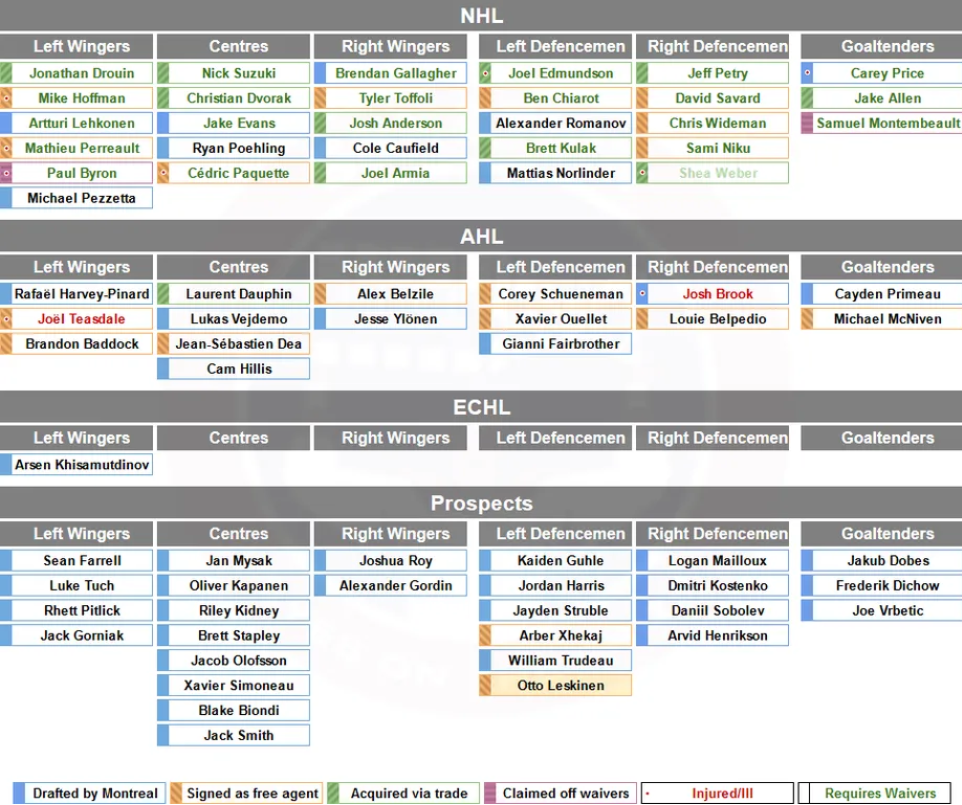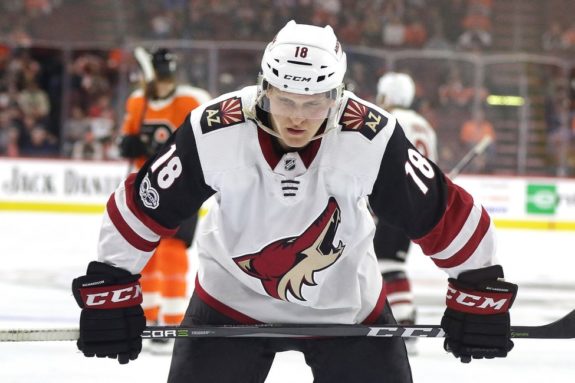Much has transpired since the left-wing edition of our ‘Canadiens’ Path to Contender’ series. Marc Bergevin is gone. Trevor Timmins is gone. Even Communications Chief Paul Wilson is gone. A new regime has begun under the guidance of newly appointed Executive Vice President of Hockey Operations, Jeff Gorton, and with that comes the expectation that change is on the horizon.
The Montreal Canadiens have a long way to go before they can start making on-ice changes. For one, they still need to hire Bergevin’s replacement. But perhaps Gorton can get a head-start on tweaks that need to be made at each position. This is the Canadiens’ Path to Contender: Center Edition.
Canadiens’ Center Position
Montreal has struggled with their center depth in the past, but we are starting to see a light at the end of the tunnel. The team has a few good pieces in place, and while the position still needs some work, it is not a dire situation.

Nick Suzuki, Jake Evans, and Ryan Poehling are all in different stages of their development, while Christian Dvorak rounds out the list with his veteran presence. Cedric Paquette adds to the club’s depth at the position but is the most expendable of the five players.
Nick Suzuki
Suzuki signed a lucrative eight-year deal worth $63 million ($7.88 million cap hit) in the offseason. The 22-year-old center stood out in the Canadiens’ Cup run last season, and he continues to be a bright spot for the team this season. He thrives under pressure and has a high hockey IQ, which are key components for playing the all-important center role. No. 14’s strong work ethic and ability to be one step ahead easily projects him as a top-six forward. However, expectations still need to be tempered. Suzuki is still developing, and while we have seen steady progress from him, there are areas he needs to work on.

The Ontario native has an excellent two-way acumen, and the stats back that up. With Suzuki on the ice this season, the team allows 2.52 expected goals against (xGA) per 60 minutes at even-strength. Without him, they give up 2.88 xGA per 60 minutes. Over the course of an 82-game season, that is about a 10-goal difference (assuming Suzuki plays 20 minutes per game). He does struggle to create scoring chances in the offensive zone, an area he can stand to improve in — especially if Montreal is going to rely on him as a top-line center. But he does make up for that in his ability to capitalize on the chances he does create.
Suzuki will be part of the Canadiens’ future for a long time. There are still some questions as to whether he is a bonified top-line center, or if he projects as more of a 1A/1B center. That will depend on his development over the next couple seasons.
Pros: Even-strength defense, hockey smarts, finishing ability
Cons: Needs work on creating high-danger chances (o-zone)
Future Outlook: In an ideal world, Suzuki develops into a top-line center. No. 14’s floor is likely a solid defensive second-line center — in which case Montreal will need to look for an offensive top-six center to complement No. 14’s game. Either way, he will be in Gorton’s plans moving forward.
Christian Dvorak
Dvorak has four years left on his contract at a cap hit of $4.45 million. The 25-year-old is not a bad player and has perhaps unfairly been the brunt of much criticism this season. He is a good skater and, at times, has proven to be reliable at both ends of the ice. That is what Bergevin saw in him and a big reason why he traded a first-round pick for the American.

In the last three seasons, Dvorak has put up respectable — but not spectacular — underlying numbers. And while his overall career numbers are passable, his last two seasons have seen those regress significantly, especially on defense. With Dvorak on the ice this season, Montreal gives up 3.22 xGA per 60 minutes at even strength. Without him, it gives up 2.60 xGA per 60 minutes. When a player is trending down, it is usually not a good sign. The Canadiens have been terrible, but for Dvorak to make that much of a negative impact on a bad team begs the question whether there’s space on the roster for him at all.
Looking back, acquiring Dvorak may have been a panic move by Bergevin to replace Phillip Danault. While the Illinois native is steady, he is not a top-six center on a contending team. Montreal already has a developing center in Jake Evans who suits the third-line role, and they also have a defensive top-six center in Suzuki. It will be difficult for the new regime to find space for Dvorak when all is said and done.
Related: Canadiens’ Path to Contender: Left Wing Edition
Pros: Two-way acumen, good skater, strong forechecker
Cons: Inconsistent production, special teams, trending down
Future Outlook: Dvorak is useful under the right circumstances, but given the way Montreal is built, there is no long-term future for him on its roster. He is a fringe second-line center, and the bottom-six is already preoccupied with Evans and Poehling. The team should move on from him in one capacity or another. His contract is not ideal but not untradeable, especially if the Habs retain salary.
Jake Evans
Evans was drafted and developed by the Canadiens and is under a bargain contract. He is not a particularly flashy player, but has a strong work ethic and versatile at both ends of the ice. With 22 points in 80 games, he is not an offensive guru, but, much like Artturi Lehkonen, can play that shutdown role effectively on the third line.

Over the last few seasons, Evans has shown steady improvement in his ability to create offense, while maintaining a sound defensive game. At 25 years old, there isn’t much development left for the Toronto native, but he has proven he can be that third-line center who can eat tough minutes at even-strength, which will be very helpful if and when Montreal acquires an elite scoring center.
Pros: Work ethic, versatility, steady at even-strength
Cons: Inconsistent production, penalty kill needs work
Future Outlook: Evans is the ideal third-line center. He can alleviate tough minutes off the top-six while chipping in on offense occasionally. He is not a world beater, but he gets the job done. If the Canadiens want to become a sustainable contender in the salary cap era, having Evans at his price is someone you want to have in the mix. Gorton has a keeper in No. 71.
Habs’ Center Outlook
When looking at other contenders around the league, it’s clear Montreal is not where it needs to be at the center position, and still doesn’t have that elite scoring center fans have been yearning for. And while the team does have its second- and third-line centers in Suzuki and Evans, the rest remain a question mark. Dvorak does not fit in the team’s long-term plans. Poehling has shown signs of improvement, but his underlying numbers suggest he has a long way to go before he can cement his roster spot.
The Canadiens have a deep prospect pool at center, with Joshua Roy and Xavier Simoneau leading the pack — both players are lighting it up for their respective teams in the Quebec Major Junior Hockey League (QMJHL) and have over 50% chance of becoming NHLers (per Hockey Prospecting). Banking on prospect development has not worked out often for the Habs, but there is a renewed hope this new regime will change that.
Geoff Molson shook up the franchise in a big way on Sunday, and with this shakeup comes changes on the ice. Montreal has needed that shakeup at center for a while now, and fans may finally see it come to fruition. As the Canadiens owner indicated, he is not afraid of a rebuild, and that rebuild may be coming soon to a theater near you. Stay tuned.